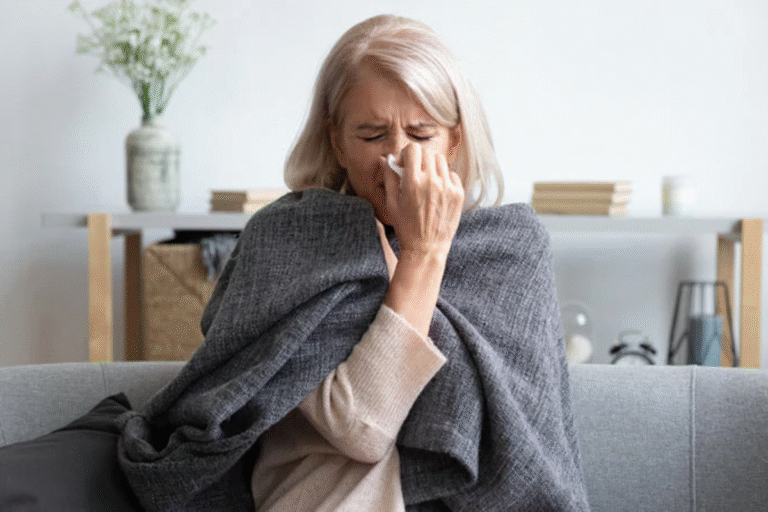
Hot flashes are one of the most common and disruptive symptoms experienced by women during perimenopause and menopause. They can vary in intensity and frequency, often impacting daily life and quality of sleep. Understanding the root cause of hot flashes is essential for finding effective ways to manage them and improve overall well-being.
Disclaimer: This article is for informational purposes only and is not meant to diagnose or treat any condition. Every woman should be evaluated by their own healthcare provider to assess what is safe and appropriate for their care.
What Are Hot Flashes?
Hot flashes are sudden, intense feelings of heat, typically concentrated in the upper body, face, and neck. They are often accompanied by:
- Flushing or redness of the skin.
- Sweating, which may lead to chills as the body cools down.
- A rapid heartbeat or feelings of anxiety.
These episodes can last anywhere from a few seconds to several minutes and may occur sporadically or several times a day.
The Role of Estrogen
The primary driver of hot flashes is fluctuating or declining levels of estrogen, which disrupt the body’s temperature regulation in the hypothalamus (the brain’s temperature control center). When estrogen levels drop, the hypothalamus may mistakenly perceive the body as overheating, triggering mechanisms to cool it down, such as sweating and increased blood flow to the skin.
Differential Diagnoses: Other Causes of Hot Flashes
It’s important to rule out other conditions that can mimic hot flashes, such as:
- Thyroid Dysfunction: Hyperthyroidism can cause similar symptoms of sweating and heat intolerance.
- Infections: Chronic or acute infections may lead to night sweats.
- Certain Medications: Hormonal treatments, antidepressants, and some diabetes medications can cause flushing.
- Anxiety Disorders: Panic attacks or generalized anxiety can lead to sudden feelings of heat.
- Carcinoid Syndrome: Rare tumors that release hormones can cause flushing episodes.
The Role of Functional Labs in Hot Flash Evaluation
Functional lab testing helps identify the underlying causes of hot flashes and guides tailored treatment. These labs may include:
- Hormone Panels: To evaluate estrogen, progesterone, testosterone, and cortisol levels.
- Thyroid Testing: Including TSH, free T3, free T4, and thyroid antibodies.
- Nutritional Deficiency Testing: To assess levels of magnesium, vitamin D, and B vitamins.
- Inflammation Markers: To identify systemic inflammation that could exacerbate symptoms.
Managing Hot Flashes: A Holistic Approach
1. Dietary Modifications
- Reduce Triggers: Limit caffeine, alcohol, spicy foods, and sugar, which can exacerbate hot flashes.
- Increase Phytoestrogens: Foods like soy, flaxseeds, and legumes contain plant-based compounds that mimic estrogen and may reduce symptoms.
- Focus on Anti-Inflammatory Foods: Include plenty of fruits, vegetables, omega-3 fatty acids, and whole grains.
2. Exercise
- Regular moderate-intensity exercise, such as walking, yoga, or strength training, helps regulate hormone levels and reduce the frequency of hot flashes.
- Avoid exercising in hot environments, as this can trigger symptoms.
3. Lifestyle Modifications
- Dress in Layers: Wear breathable fabrics and layer clothing for easy adjustment.
- Optimize Sleep: Use cooling pillows and fans to prevent overheating at night.
- Stress Management: Practice relaxation techniques like deep breathing, meditation, or tai chi to reduce stress, which can exacerbate symptoms.
Herbal Remedies for Hot Flashes
Certain herbs have been shown to reduce the intensity and frequency of hot flashes:
- Black Cohosh: A popular remedy for menopausal symptoms, including hot flashes.
- Red Clover: Contains phytoestrogens that may help balance hormones.
- Evening Primrose Oil: Known for its anti-inflammatory properties.
- Ashwagandha: Reduces stress and helps regulate cortisol levels.
Note: Always consult with a healthcare provider before starting any herbal supplement, as these can interact with medications or have side effects.
Prescription Medications for Hot Flashes
If lifestyle changes and herbal remedies aren’t enough, prescription options are available:
- Hormone Replacement Therapy (HRT): The most effective treatment for hot flashes, especially for women with moderate to severe symptoms. HRT includes estrogen alone or combined with progesterone.
- Non-Hormonal Options:
- Antidepressants (e.g., SSRIs or SNRIs)
- Gabapentin (often used for hot flashes and night sweats)
- Clonidine (a blood pressure medication)
Further Reading and Resources
- The Wisdom of Menopause by Dr. Christiane Northrup
- Hormone Repair Manual by Lara Briden
- Research Articles:
How Antigravity Wellness Can Help
At Antigravity Wellness, we specialize in the care of perimenopausal and menopausal women. Hot flashes are one of the many symptoms we address through our holistic and functional medicine approach, combining dietary modifications, lifestyle strategies, and, when appropriate, medical treatments.
If hot flashes are disrupting your life, schedule a brief initial consult today to explore how we can help you achieve relief and regain control of your health.




